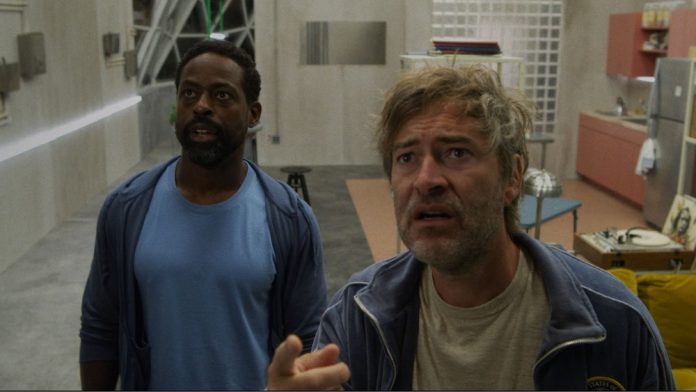The premise of Mel Eslyn‘s directorial debut, Biosphere, seems simple enough on its surface, as the film follows the last two people on Earth — Mark Duplass‘ Billy and Sterling K. Brown‘s Ray -who live together in a biodome following an undefined atmospheric catastrophe.
Eslyn co-wrote the script with Duplass, who she has been working alongside in various capacities for many years, having produced some of the movies he starred in, as well as several films from the late, great Lynn Shelton, such as Laggies and Outside In (with Mark’s brother, Jay Duplass). Eslyn also helps run Duplass Brothers Productions, which is responsible for some of the best indie comedies of the past decade, as well as acclaimed HBO shows such as Togetherness, Room 104, and current Emmy hopeful Somebody Somewhere.
Biosphere is a movie that would have made Shelton proud because it features the kind of fascinating character dynamics that typified her work, though it’s also very unique to Eslyn, who directs Duplass and Brown through some wild and quite hilarious interactions. The movie first premiered at last year’s Toronto International Film Festival, where its reception led IFC Films to acquire it for distribution and release it as counterprogramming in between blockbusters such as Indiana Jones and the Dial of Destiny and Mission: Impossible – Dead Reckoning Part One.
Above the Line recently hopped on Zoom with Eslyn and Duplass to talk about how Biosphere developed from the germ of an idea they’d been playing around with long before COVID, and how Eslyn continued to run Duplass Brothers Production while wearing multiple hats on her directorial debut.
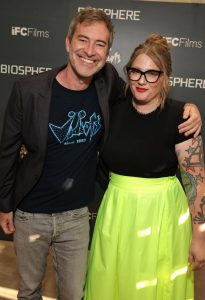
Above the Line: Mel, I’ve spoken to Mark many times over the years and probably covered a lot of the movies you’ve produced, including a few that didn’t feature Mark, but tell me how the two of you met. Was it through Lynn?
Mel Eslyn: I first met Mark on a night that he doesn’t remember, but it was New Year’s Eve. I was actually making a movie with his wife [Katie Aselton] right after they made Humpday. But then, I think Your Sister’s Sister was the first time we worked together, and I was kind of the whole production office in one person, and spending a lot of time in one cabin that Mark would come hang out in. At some point, he was like, ‘We should make things together.’
Mark Duplass: I think it was, like, on Day 2 when I realized what Mel was capable of, and I was like, “Nobody here knows the gold mine that is Mel Eslyn, and I do,” and I had my sights set. It was 10 years from that moment until she was running our company.
ATL: Mark, I feel like you’re kind of an indie director whisperer, because you find this great talent, and the next thing you know, they’re directing a feature with you in it.
Duplass: I wouldn’t say that I’m a whisperer, but I pay attention. I think now, at this point in my career — if you’ve noticed, I haven’t directed a movie in almost 10 years now — I realized that probably my biggest strength is in the team-building [and] starting [to] write the idea, and then using my company to help support [it] with funds and equipment and all that stuff. Really, [it’s about] having that person [who]… it is their unique vision all the way through.
[Directing] really isn’t my forte at this stage in my life, and it was so clear to me, as Mel and I started to collaborate more and more and more. First, she was a first assistant director, and then, [part of] the production team. And then, I said, ‘Mel, why don’t you come [and] produce The One I Love for us?’ That was her chance to really take over a movie as [a] producer. I would watch her in the edit room and see all the creative ideas she had.
This is no secret, but when you produce a lot of movies, sometimes those movies don’t come in as fully formed as you would like. I watched her become sort of a backseat director in a lot of ways [on] a lot of the movies we worked on. It was obvious to me [that] she had the skill and the talent, [so] then it became a discussion of the time [it takes to make a movie] because she was running our company. “How does Mel direct and truly lead a feature film, while at the same time wearing the hat of being the head of Duplass Brothers?” That was the hardest thing to figure out.
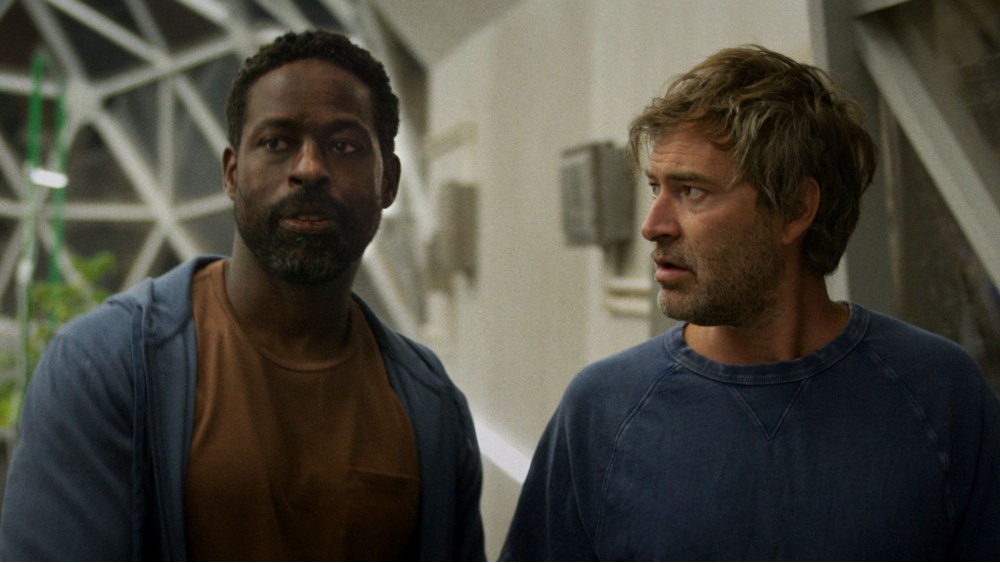
ATL: I think I read that the idea for this came up five years ago, which was well before anyone even knew that something called COVID was going to hit the world and grind production to a halt. And yet, it’s coming out at the perfect time after we’ve all been sequestered together. Did the script change a lot when COVID hit?
Eslyn: I don’t think it changed because of COVID. It just weirdly was relevant, suddenly, in a way that we weren’t planning on. What the pandemic did do is create, especially for me, like Mark said, [while] running the company. I would never create space for my own things, and suddenly, now we’re all stuck at home and I was able to justify making a bit more space [for myself] as a director and writer and fit that in.
Duplass: I do think, to your point about [the] script being five years old, and finding its relevance now in ways that we didn’t expect, that is part of our creative process, to a certain degree. I’ve become somewhat the generator at our company for a lot of ideas. I can get things moving quickly, but I don’t have good finishing power at all. Mel, in particular, is excellent at that.
This was a script that came to me as a loose set of ideas about two guys in a dome, and maybe they did something really bad, and maybe they’re a part of the reason they’re in the dome and the reason why the world isn’t where it is. And then we had certain other ideas about certain themes we wanted to incorporate. But it was before people were throwing around terms like ‘toxic masculinity’ that were happening in our big social culture. As that stuff started to come to the forefront and started to seep into our subconscious, it was almost — dare I say? — a convergent evolution of creative ideas for the script and what was happening around us.
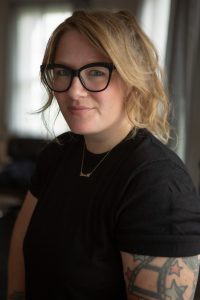
ATL: This almost feels like a thematic sequel to Humpday, and since you both worked with Lynn, did you think about her and that film at all, or did you just see this as a buddy comedy that had a similar feel?
Eslyn: We definitely didn’t consciously think of it. I do remember a moment — I think it was on set, actually — when I was looking at Mark and Sterling, and something about it visually reminded me of Mark and Josh [Leonard] in Humpday. I just had this moment where I was like, ‘Oh, that’s so wild. We’re kind of going back to that theme but pushing things.’
I hesitate [to say more] because it’s so hard to talk about this film in [the] press because there’s so much we’re trying to leave for the authentic experience of not knowing too much. I think it being a two-hander with two straight males, I think there were a lot of [similar] themes, and Lynn was absolutely, in my mind, a part of this ultimately happening when it did — because of her passing, which was god-awful and so hard for all of us.
I was cleaning her house out right after it happened and just really immersed in her and all the memories. I remember the first time I met her, and she said, ‘I waited too long. I made my first film when I was 39,’ and she said that to me in my 20s, and I said, ‘Oh, I have so much time,’ and now I’m dealing with her death, and I’m realizing, ‘I’m two years from 39. Oh my God,’ and then you’re just like, time… there’s only so much of it. There was sort of this motivator of dealing with that grief to push me to make space for this [film].
ATL: Let’s talk about Sterling, who is clearly such an important part of this. He’s just an amazing actor, so how did you pitch it to him? Did you know him before, Mark? Had you worked with him before?
Duplass: I knew him a tiny bit socially. We each knew that we were fans of each other. I had a sense that we would have good chemistry, so definitely — as Mel and I were building this thing — he was the guy. We wanted to make this for him, but then Mel and I had to figure out, ‘How are we going to get him to do this in the right way? Because if we don’t get him, we’re gonna be heartbroken.’ There was a little bit of that to think about.
Eslyn: At a certain point, we were like, ‘We just have to send it to him.’ The dialogue is written for him to speak it, and…
Duplass: We’ll just have to wait and just die as we wait for him to read it.
Eslyn: This never happens. We sent it to him, and the next morning, he Zooms us while he’s driving his car.
Duplass: [He] literally read it that night, and the next morning he was in. It was crazy.
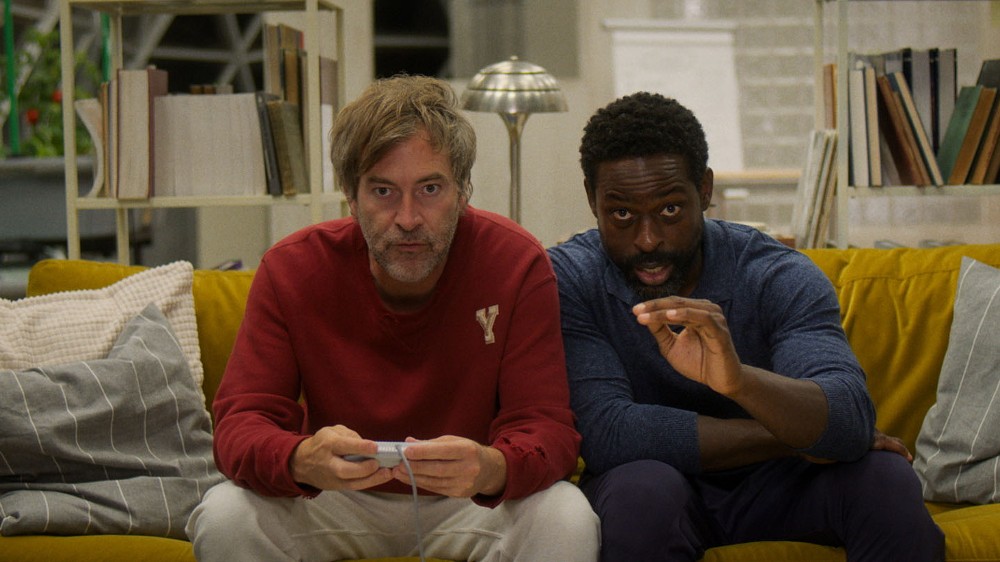
ATL: Did you guys arrive early on your roles and the fact that your character was the President of the United States and Sterling’s character was his chief scientist? Was that always part of the script?
Duplass: I would say from the moment it started to become a movie, it was that. I had this initial idea of these two guys living in a biodome, arguing very passionately about the nature of Super Mario Brothers in the relationship of the men, almost in a way that I would start a play. I trusted that that had something in it, but I didn’t really know what. It was really by bringing that story to Mel and her partnership in the screenwriting as she — kind of like a magician — started to bring out all these elements that were integral to that initial germ of an idea I gave her.
ATL: The screenplay is very tight, so was there any room for improvising on set or trying different things out, or was that kept to a minimum in order to stay on time and not deviate from the script?
Eslyn: I think Mark always makes that space.
Duplass: Whether they give it to me or not, I end up doing it.
Eslyn: Exactly. He’s gonna find his way in, which is the magic of him. I think we’re both so used to improv, but I will say I am such a fan of digging in and having it on the page. It was interesting to bring that part, which I normally don’t bring with Mark’s energy, and just to find this middle ground. We were also working with Sterling, who is coming into this relationship that Mark and I have. We have [a] shorthand at this point, and I think it created a safe space for him, but there were so many times when Mark and I would just get revved up and start chanting things, and not even in complete sentences, and Sterling would be like, ‘Guys, I spent all night rehearsing this. I’ve really developed my journey. Can we just try one where I stay on [the page]?’ [So] it’s cool. We got a good mix of all of that.
Duplass: It’s a very different process from what we used to do with Lynn and some of my earlier films because we wouldn’t work from a full script with Lynn most of the time. This [Biosphere] was highly scripted. We put it through our development process at the company [and] trimmed it down to its core elements. So we were on script, and then there were moments where we went off to try and create a little extra chemistry or create extra surprises, but this thing was mostly on the rails.
ATL: As far as getting your heads of department for this, you obviously produced a lot of movies, so did you have a bunch of DPs that you could call upon for this or did you have a specific DP in mind to shoot your first feature?
Eslyn: I had a lot of built-up favors — 10 years of people owing me things. No, it was perfect. I’m such a big believer that the best directors bring in the right collaborators. That’s such a big, key component of that. Almost every crew member on set I’d had some connection with or history or interaction, especially the DP. [Nathan Miller] is a long-term partner of mine who Mark actually worked with long before I did on Humpday, so there was history there, and again, a shorthand. A lot of us were moving with each other as a unit, just having all that history.
Duplass: I’m gonna just contradict one thing on that, because Mel can’t say this, but nobody really feels like they owe Mel any favors. The truth is that as much as she’s given them, they’ve given her and us back. Everybody came to this movie because they love Mel, [and] nobody takes care of their crew better than Mel.
Eslyn: My interpretation of that is, ‘Well, they must owe me something.’ [laughs]
Duplass: No, they don’t owe you anything. They’ve given us a lot. They came because they love you, and they wanted to be there for it. Period.
Eslyn: I feed them very well… [laughs]
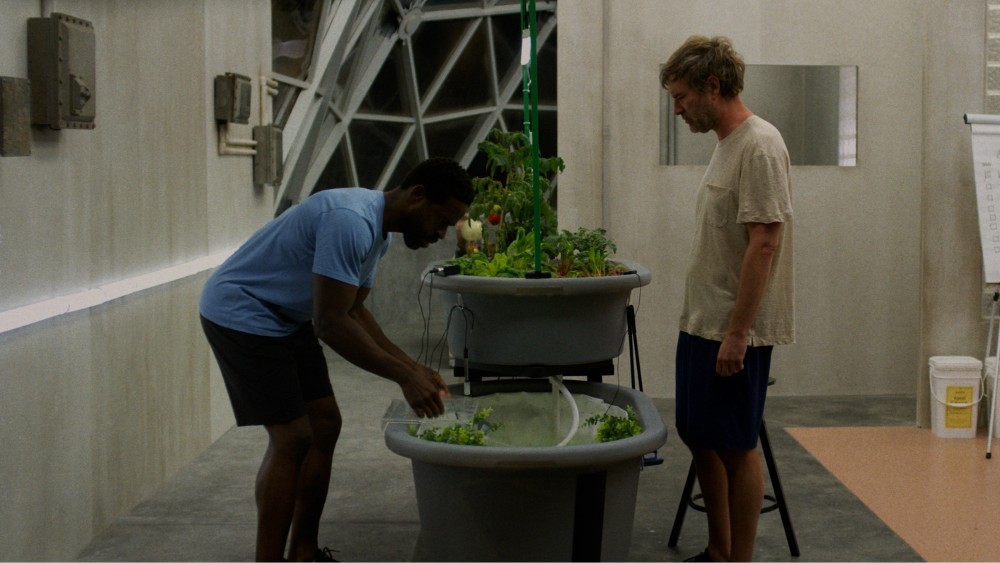
ATL: Let’s talk about the space you created for the two actors, as the production value of this movie really seems bigger due to the set design and decoration. Did you spend a lot of time working that out before starting to build it?
Eslyn: Yeah, absolutely. I grew up in the Midwest, in Milwaukee, Wisconsin, and we have this place called the Mitchell Park Domes. I used that as my ideal dome, my ideal biosphere. I’d done a lot of sketches, and then I brought it to our amazing production designer, Megan Fenton, who we’ve worked with many times. She does our HBO show Somebody Somewhere, and she was really the one who said, ‘Okay, we’ve got this stage. Here are the dimensions, here’s how we can make it work, and here’s how we can make it feel like you have different rooms in the biosphere, but you’re never alone.’ Even down to the bathroom wall being a see-through wall, so there’s never a sense of privacy. It wasn’t exactly what I envisioned, but I don’t think anything ever can be, and I think that’s the joy of filmmaking, being open to other people’s new ideas and challenging what your original idea was.
Duplass: And particularly the joys of Duplass Brothers filmmaking, which is always on a budget.
Eslyn: Mark and I have done maybe more two-handers than anybody. I made a two-hander as my first film to just be kind [to] myself because that’s the best way to start out — just don’t overdo it. But I think we’ve done it so many times, we were like, ‘This has to be different. This has to feel different. We have to push things further than we’ve pushed before, because we may have overstayed our welcome.’
ATL: I don’t know about that… but what’s next for you? Are you back to running the company and doing what that entails? Biosphere premiered at TIFF last fall, so I know it’s been done for a while.
Eslyn: Yeah, it’s been done for a while. I mean, yes, I get very busy with the Duplass Brothers, they keep me busy. But no, Mark and I have developed a few secret projects that haven’t been announced yet. We like to make things under the radar in our little bubble and then show it to people when it’s done and surprise them.
Duplass: Mel and I do have another big creative collaboration endeavor that is in the can, and we’re going to be taking it out into the world shortly.
ATL: So, something that might be at Sundance or SXSW, and everyone will be like, “Where did this movie come from?”
Eslyn: I like the conversation of the film to happen after you’ve seen it, [rather] than before. [The less] you tell them about it going into it, the better.
IFC Films will release Biosphere in select theaters on Friday, July 7.


